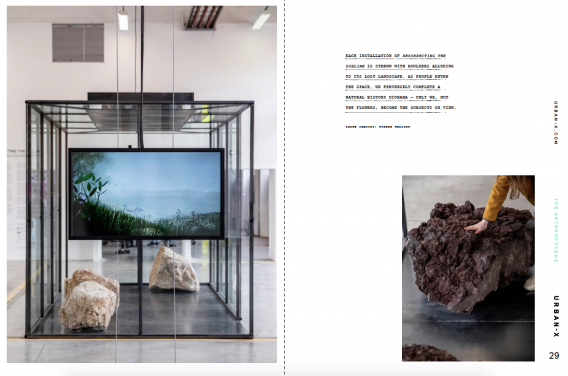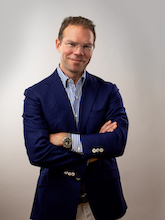
















As part of my duties as the inaugural “Urbanist-in-residence” at URBAN-X – the startup accelerator founded by BMW MINI – I guest edited the first three issues of its annual magazine. The third and final issue appears this month, with the theme of “BETTER,” as in the startup catechism “…and make the world a better place.” But as the stories in this issue make clear, “better” is a subjective choice at best.
To commemorate its publication, you can download a complete PDF of the issue here, while the editor’s letter appears below. You can also read articles about the URBAN-X startups Toggle and Treau and how they hope to wriggle free of the Jevons Paradox, and a Q&A with Thrilling co-founder Shilla Kim-Parker about why we need to slow down fast fashion and why vintage shopping is good for cities. And don’t miss the artist scientist Dr. Alexandra Daisy Ginsburg on her efforts to recreate the scents of extinct flowers and what it says about our notions of “better” – more of which is in the editor’s note below.
Finally, if you’re in New York on Dec. 4th, please join us at the official issue launch party, featuring a live version of the “Green New Deal Flow” roundtable discussion that anchors the issue. I hope to see you there.
***
The flower Hibiscadelphus woodii was thought to be extinct until this spring, when the Hawaiian National Tropical Botanical Garden announced it had discovered a few hardy specimens clinging to a cliff. Before that, the artist Dr. Alexandra Daisy Ginsberg had spent a year reconstructing the scent of another long-dead hibiscus, prompting her to wonder which world is better – one where the technology exists to resurrect the scent of lost flowers, or one in which they never went extinct at all? While the answer may seem obvious, in our rush to create better cities she reminds us to inquire: “What is better? Whose better? Who decides?”
Technology promises to solve many of our problems, including challenges that are part of our urban lives. Yet under the premise of greater efficiency, accessibility, enhanced experiences, and betterness, are we really solving challenges or simply creating new ones? Our relationship with the environment is under threat, and while this might be seen as the consequence of a selfish human condition, it’s reflective of our own limitations – nature doesn’t need us, we need nature.
The third edition of the URBAN-X Zine unpacks better against the backdrop of the Anthropocene Era, in which it is fair to question what progress means for climate change. In this issue’s centerpiece about green-impact investing, the German Marshall Fund’s David Zipper notes that the Green New Deal resolution is framed in a vision of social justice, asserting a different notion of better than purely market forces would dictate. We profile URBAN-X Cohort 05 members Toggle and Treau who interrogate the Jevons Paradox, which states that every attempt at better energy efficiency eventually becomes its own undoing. As climate change gathers speed, it is equally imperative to decide what a “better place” is, in order to invest in and invent the technology to achieve it.

» Folllow me on Twitter.
» Email me.
» See upcoming events.

Greg Lindsay is a generalist, urbanist, futurist, and speaker. He is a non-resident senior fellow of the Arizona State University Threatcasting Lab, a non-resident senior fellow of MIT’s Future Urban Collectives Lab, and a non-resident senior fellow of the Atlantic Council’s Scowcroft Strategy Initiative. He was the founding chief communications officer of Climate Alpha and remains a senior advisor. Previously, he was an urban tech fellow at Cornell Tech’s Jacobs Institute, where he explored the implications of AI and augmented reality at urban scale.

----- | January 22, 2024
The Future of Generative AI in Architecture, Engineering, and Construction
----- | January 1, 2024
----- | August 3, 2023
CityLab | June 12, 2023
Augmented Reality Is Coming for Cities
CityLab | April 25, 2023
The Line Is Blurring Between Remote Workers and Tourists
CityLab | December 7, 2021
The Dark Side of 15-Minute Grocery Delivery
Fast Company | June 2021
Why the Great Lakes need to be the center of our climate strategy
Fast Company | March 2020
How to design a smart city that’s built on empowerment–not corporate surveillance
URBAN-X | December 2019
CityLab | December 10, 2018
The State of Play: Connected Mobility in San Francisco, Boston, and Detroit
Harvard Business Review | September 24, 2018
Why Companies Are Creating Their Own Coworking Spaces
CityLab | July 2018
The State of Play: Connected Mobility + U.S. Cities
Medium | May 1, 2017
Fast Company | January 19, 2017
The Collaboration Software That’s Rejuvenating The Young Global Leaders Of Davos
The Guardian | January 13, 2017
What If Uber Kills Public Transport Instead of Cars
Backchannel | January 4, 2017
The Office of the Future Is… an Office
New Cities Foundation | October 2016
Now Arriving: A Connected Mobility Roadmap for Public Transport
Inc. | October 2016
Why Every Business Should Start in a Co-Working Space
Popular Mechanics | May 11, 2016
Can the World’s Worst Traffic Problem Be Solved?
The New Republic | January/February 2016

January 31, 2024
Unfrozen: Domo Arigatou, “Mike 2.0”
January 22, 2024
The Future of Generative AI in Architecture, Engineering, and Construction
January 18, 2024
The Promise and Perils of the Augmented City
January 13, 2024